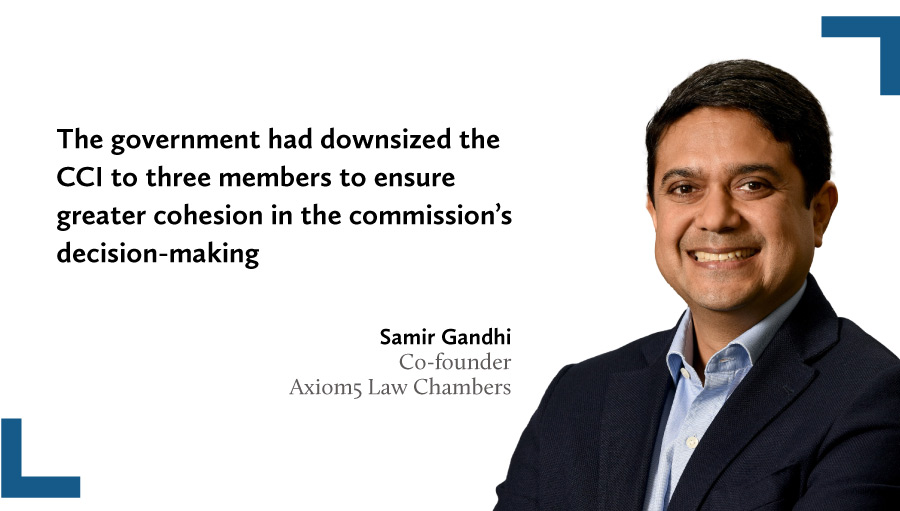Government indecision on a major appointment to India’s antitrust watchdog has left it in a regulatory limbo, unable to properly enforce or protect, Freny Patel reports.
The government’s failure to fill the empty chairman’s seat at the Competition Commission of India (CCI) has left the nation’s antitrust regulator unable to fulfill its statutory role, leading experts on competition say.
After the former chairman, Ashok Kumar Gupta, retired in October 2022, the commission lacked the three-member quorum required under the Competition Act of 2002 in order to approve mergers or make enforcement decisions. Although Sangeeta Verma has been given the role of acting chairperson, there is only one other member – Bhagwant Singh Bishnoi.
The immediate threat from delays, soaring costs and mounting litigation risk for a crowded pipeline of mergers and acquisitions has been defused by a government order granting emergency powers to approve deals.
But the experts caution that this fix is only a temporary patch and does not cover all aspects of the watchdog’s work. In addition, the question of vacant seats will come up again later this year, when the two remaining members are due to retire.
“Unfortunately, the most direct fallout was on the merger applications, several of which were pending,” says Vinod Dhall, a senior adviser at Touchstone Partners in New Delhi. Dhall was a founding member of the commission and its first acting chairman.
Lawyers advising on big-ticket international M&A deals grew nervous as merger clearances came to a standstill in October 2022.
It was not possible to carve out the Indian leg of global takeovers without the risk of attracting potential gun-jumping charges because of the concept of interconnected transactions, says Bharat Budholia, a Mumbai-based partner at AZB & Partners.
Firmenich, the world’s largest privately owned fragrance and taste company, and the Dutch health, nutrition and bioscience firm DSM, extended the deadline of their global merger to 11 April 2023 from the initial one of 31 January. Their joint statement said that the delay in closing the deal was on account of the Indian competition authority not having the necessary three-member quorum to approve the global transaction.
By January, as it became clear that there would be a delay in the appointment of a new chair, the government and the commission started looking into what could be done in the interim.
“Finally, the government issued a notification authorising the commission’s two members to decide the pending merger applications by invoking the legal doctrine of necessity,” says Dhall.
The doctrine of necessity allows authorities to take certain actions that otherwise would not be possible under the relevant legislation. The doctrine has been used by Indian courts on numerous occasions.
The logjam of merger filings began to move in early February, and the commission has since cleared 15 pending deals that it said did not pose any competition concerns. This brought welcome relief to the merging parties.
The stakes in M&A deals can be very high, with parties involved often taking out bridge financing that can carry heavy interest liabilities, says Budholia.
The doctrine of necessity has allowed the commission to clear highly time-sensitive M&A transactions, says Samir R Gandhi, partner and co-founder of Axiom5 Law Chambers in New Delhi.
“The competition authority is playing it very safe, using the doctrine of necessity to clear straightforward merger filings in its endeavour to continue to support businesses as far as possible,” says Sonam Mathur, a New Delhi-based partner at TT&A.

However, Gandhi, of Axiom5, says: “The doctrine does not provide a permanent solution and may be susceptible to judicial challenge if it were to be invoked for combinations in phase II that may be contested and require adjudication.”
You must be a
subscribersubscribersubscribersubscriber
to read this content, please
subscribesubscribesubscribesubscribe
today.
For group subscribers, please click here to access.
Interested in group subscription? Please contact us.
你需要登录去解锁本文内容。欢迎注册账号。如果想阅读月刊所有文章,欢迎成为我们的订阅会员成为我们的订阅会员。
Competition Commission of India (CCI) stories
Black & white
The Competition Amendment Bill contains commendable reforms, but there are also negatives.
Rules of engagement
Application of per se rule can save the CCI time and costs while investigating anti-competitive behaviours
Don’t ignore CCI’s teeth
The competition regulator has taken an assertive enforcement stance in the post-pandemic era.
For more stories about CCI, visit law.asia.





























